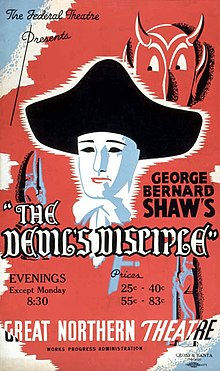The Devil's Disciple
| The Devil's Disciple | |
|---|---|

Poster from the Federal Theatre Project, Work Projects Administration production, November 1937
|
|
| Written by | George Bernard Shaw |
| Date premiered | 1897 |
| Place premiered | London |
| Original language | English |
| Genre | Melodrama |
| Setting | Websterbridge, New Hampshire, 1777 |
The Devil's Disciple is an 1897 play written by Irish dramatist George Bernard Shaw. The play is Shaw's eighth, and after Richard Mansfield's original 1897 American production it was his first financial success, which helped to affirm his career as a playwright. It was published in Shaw's 1901 collection Three Plays for Puritans together with Captain Brassbound's Conversion and Caesar and Cleopatra. Set in Colonial America during the Revolutionary era, the play tells the story of Richard Dudgeon, a local outcast and self-proclaimed "Devil's disciple". In a twist characteristic of Shaw's love of paradox, Dudgeon sacrifices himself in a Christ-like gesture despite his professed Infernal allegiance.
The setting is in the Fall of 1777, during the Saratoga Campaign.
Dick Dudgeon is an outcast from his family in colonial Websterbridge, New Hampshire. He returns their hatred with scorn. After the death of his father, Dick returns to his childhood home to hear the reading of his father's will, much to his family's dismay. Anthony Anderson, the local minister, treats him with courtesy despite Dick's self-proclaimed apostasy, but Dick's "wickedness" appalls Anderson's wife Judith. To everyone's surprise, it is revealed that Dick's father secretly changed his will just before he died, leaving the bulk of his estate to Dick. Dick promptly evicts his mother from her home, but also invites his cousin Essie (the illegitimate daughter of Dick's never-do-well uncle Peter), orphaned by the hanging of her father as a rebel by the British, to stay as long as she wants. At the end of the Act, Dick proclaims himself also a rebel against the British and scorns his family as cowards when they flee his home. He warns Anderson that the approaching army hanged his uncle in error, believing him to be a man of highest respect, unaware of his ill repute, and that Anderson will be the example set in Websterbridge.
While visiting Anderson's home at the Reverend's invitation, Dick is left alone with Judith while Anderson is called out to Mrs. Dudgeon's deathbed. Perceiving Judith's distaste for him, Dick attempts to leave, but Judith insists he stay until Anderson returns. While they are waiting, British soldiers enter Anderson's home and arrest Dick, mistaking him for Anderson. Dick allows them to take him away without revealing his actual identity. He swears Judith to secrecy lest her husband give the secret away and expose himself to arrest. Anderson returns and finds his wife in a state of great agitation. He demands to know if Dick has harmed her. Breaking her promise to Dick, Judith reveals that soldiers came to arrest Anderson but Dick went in his place. Anderson is stunned. He grabs all his money and a gun and quickly rides away, ignoring Judith's appeals. Judith believes her husband to be a coward, while Dick, whom she despised, is a hero.
...
Wikipedia
